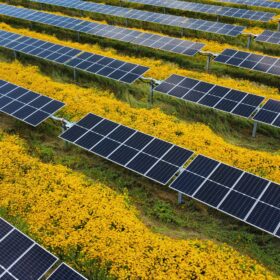How agrivoltaics can alleviate Washington’s mounting agricultural, energy pressures
An in-depth study looked at the varying facets within Washington’s agriculture industry to determine how and where agrivoltaics can be best implemented to help meet the state’s energy needs and provide financial support to the state’s agriculture industry.
Washington farmers divided over solar on farmland, agrivoltaics largely unknown
A research survey of farmers and ranchers across Washington state offers insight into how developers can best approach solar development in The Evergreen State.
Colocating solar with Washington’s most valuable crop
When designed right, colocating apple orchards and solar installations can be not only economically beneficial for the landowner, but produce a higher rate of marketable apples.
Agrivoltaic shading, full-sun fields gives farmers the power to pivot
Research conducted at the oldest agrivoltaic research site in the United States found year-to-year weather variability impacts agrivoltaic crop production, emphasizing the importance in conducting studies across multiple years.
With ramped-up local restrictions, renewable energy marches on
Residents and local restrictions are delaying and blocking renewable energy projects at an accelerated rate, a study from Columbia University found.
No photon left behind: NREL develops translucent solar panels for bigger, better crops
Researchers at the National Renewable Energy Laboratory grew tomatoes under translucent solar panels, which could play a promising role in agrivoltaics.
Canada’s path to 2030: Tripling renewables and land conservation are both possible
Countries can avoid conflict between biodiversity conservation efforts and renewable energy development by using proactive measures, found a model developed by The International Energy Agency and Natural Resources Canada.
To transition from fossil fuel to solar energy, researchers say ‘rules of the game’ must also shift
Pennsylvania State researchers found that solar opponents equated non-disclosure agreements with gag orders because of their unethical use within hydraulic fracking even though solar developers used the agreements for very different reasons.
Yes in my backyard: research rejects ‘NIMBY’ hypothesis for solar opposition
Most people who live near large-scale solar projects have positive or neutral feelings about the solar project and only 18% would be opposed to additional solar projects, found a national survey published in Frontiers in Sustainable Energy Policy.
Solar grazing undergoing rapid growth, census finds
The scale of livestock grazing in agrivoltaic installations is much larger than previously understood, found the first solar grazing census by the National Renewable Energy Laboratory and the American Solar Grazing Association.















